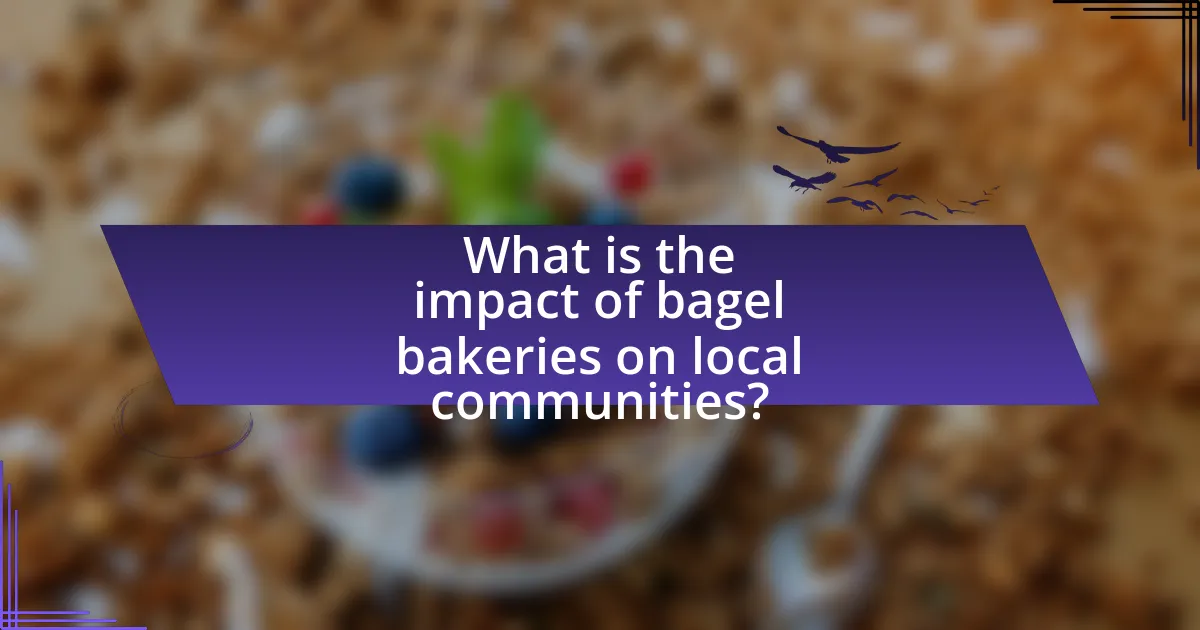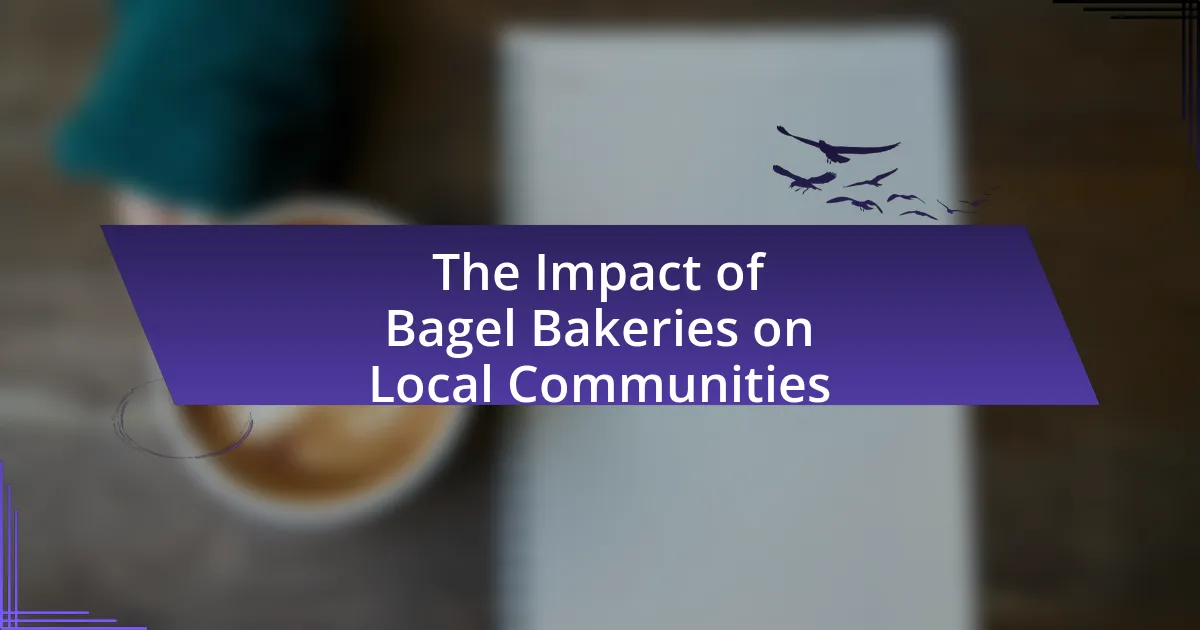Bagel bakeries play a significant role in local communities by driving economic growth, creating job opportunities, and enhancing social interactions. They contribute to local economies through job creation, sourcing ingredients from nearby suppliers, and stimulating community engagement. These establishments serve as cultural hubs, reflecting local heritage and fostering community identity while promoting healthier eating habits through nutritious offerings. However, bagel bakeries also face challenges such as competition from larger chains and regulatory hurdles that can impact their sustainability. Overall, the presence of bagel bakeries enriches community life by supporting local economies and fostering social connections.

What is the impact of bagel bakeries on local communities?
Bagel bakeries positively impact local communities by fostering economic growth, creating jobs, and enhancing social interactions. These establishments contribute to the local economy by generating revenue and providing employment opportunities; for instance, a study by the American Baker’s Association indicates that bakeries can create up to 1.5 jobs for every $100,000 in sales. Additionally, bagel bakeries often serve as community hubs, where residents gather, thus promoting social cohesion and cultural exchange. This interaction can lead to increased community engagement and support for local initiatives, further strengthening the community fabric.
How do bagel bakeries contribute to local economies?
Bagel bakeries contribute to local economies by creating jobs, stimulating local spending, and fostering community engagement. These establishments often employ local residents, providing both full-time and part-time positions, which helps reduce unemployment rates in the area. For instance, a study by the American Baker’s Association indicates that small bakeries can generate approximately 1.5 jobs for every $100,000 in sales. Additionally, bagel bakeries source ingredients from local suppliers, which keeps money circulating within the community and supports other local businesses. Furthermore, they often serve as social hubs, encouraging community interaction and participation in local events, thereby enhancing the overall economic vitality of the area.
What job opportunities do bagel bakeries create in the community?
Bagel bakeries create various job opportunities in the community, including positions such as bakers, cashiers, and kitchen staff. These roles contribute to local employment by providing jobs that require different skill levels, from entry-level positions to skilled baking roles. For instance, a study by the American Baker’s Association indicates that the baking industry supports over 800,000 jobs nationwide, highlighting the significant employment potential of bakeries, including bagel shops. Additionally, bagel bakeries often hire part-time workers, which can be particularly beneficial for students and those seeking flexible work hours, further enhancing community job accessibility.
How do bagel bakeries influence local spending patterns?
Bagel bakeries influence local spending patterns by attracting customers who contribute to the local economy through their purchases. These establishments often create a hub for community interaction, leading to increased foot traffic in the surrounding area. For instance, a study by the American Economic Association found that local bakeries can boost nearby retail sales by up to 20% due to the increased number of visitors. Additionally, bagel bakeries typically source ingredients from local suppliers, further stimulating local economic activity. This interconnectedness enhances overall community spending and supports local businesses.
What social benefits do bagel bakeries provide?
Bagel bakeries provide significant social benefits by fostering community engagement and supporting local economies. These establishments often serve as gathering places where individuals can connect, share experiences, and build relationships, enhancing social cohesion. Additionally, bagel bakeries contribute to local economies by creating jobs and sourcing ingredients from nearby suppliers, which stimulates economic activity within the community. For instance, a study by the American Baker’s Association highlights that local bakeries can generate substantial employment opportunities, thereby reducing unemployment rates in their areas.
How do bagel bakeries foster community engagement and interaction?
Bagel bakeries foster community engagement and interaction by serving as social hubs where people gather, share experiences, and build relationships. These establishments often host events such as community breakfasts, fundraisers, and local art displays, which encourage participation and collaboration among residents. For instance, a study by the American Bakery Association highlights that local bakeries contribute to community cohesion by providing a space for informal gatherings, thus enhancing social networks. Additionally, bagel bakeries frequently source ingredients from local farmers and suppliers, reinforcing economic ties within the community and promoting a sense of local pride.
What role do bagel bakeries play in cultural exchange?
Bagel bakeries serve as vital hubs for cultural exchange by introducing diverse culinary traditions and fostering community interactions. They often reflect the cultural heritage of immigrant populations, particularly Jewish communities, which popularized bagels in the United States. This exchange is evident in the incorporation of various toppings and styles, such as cream cheese, lox, and international flavors, which attract a wide range of customers. Additionally, bagel bakeries often host events and collaborations that celebrate cultural diversity, further enhancing their role as community gathering spaces. The presence of these bakeries contributes to a richer, more interconnected local culture, showcasing how food can bridge cultural divides.
Why are bagel bakeries important for local identity?
Bagel bakeries are important for local identity because they serve as cultural hubs that reflect the community’s heritage and culinary traditions. These establishments often embody the unique flavors and recipes passed down through generations, contributing to a sense of belonging among residents. For instance, in cities with significant Jewish populations, bagel bakeries often preserve traditional methods and ingredients, reinforcing cultural ties. Additionally, bagel bakeries frequently become gathering places for locals, fostering social interactions and community engagement, which further solidifies their role in shaping local identity.
How do bagel bakeries reflect the history and culture of their neighborhoods?
Bagel bakeries reflect the history and culture of their neighborhoods by serving as cultural hubs that showcase local traditions and immigrant influences. For instance, many bagel shops originated in Jewish communities, particularly in cities like New York, where they became integral to the culinary landscape, representing the cultural heritage of Eastern European immigrants. Additionally, bagel bakeries often adapt their offerings to include local flavors and ingredients, which further illustrates the unique identity of their neighborhoods. This adaptability not only preserves traditional recipes but also fosters community engagement, as these establishments often become gathering places for residents, reinforcing social ties and local culture.
What unique offerings do bagel bakeries provide that enhance local character?
Bagel bakeries enhance local character by offering region-specific flavors and ingredients that reflect the community’s cultural heritage. For instance, many bagel shops incorporate local produce, spices, or traditional recipes that resonate with the area’s history and demographics. This practice not only fosters a sense of identity but also attracts customers who appreciate the unique culinary experience tied to their locality. Additionally, bagel bakeries often serve as community hubs, hosting events or collaborating with local artists, which further strengthens their connection to the neighborhood.

How do bagel bakeries impact community health and wellness?
Bagel bakeries positively impact community health and wellness by providing accessible, nutritious food options and fostering social connections. These establishments often offer whole grain and low-fat bagel varieties, which can contribute to healthier dietary choices. Research indicates that communities with local food options, like bagel bakeries, experience improved dietary habits and reduced rates of obesity. Additionally, bagel bakeries serve as social hubs, promoting community engagement and mental well-being through shared dining experiences. This combination of nutritious offerings and social interaction enhances overall community health.
What nutritional aspects do bagel bakeries contribute to local diets?
Bagel bakeries contribute essential carbohydrates, proteins, and dietary fiber to local diets. The primary ingredient in bagels, wheat flour, provides a significant source of carbohydrates, which are crucial for energy. Additionally, bagels often contain protein from ingredients like eggs or seeds, enhancing their nutritional profile. Many bagel varieties incorporate whole grains, which increase dietary fiber content, promoting digestive health. Furthermore, bagel toppings such as vegetables, spreads, and proteins can add vitamins, minerals, and healthy fats, further enriching the nutritional value of meals. This combination of nutrients supports overall health and well-being within the community.
How do bagel bakeries promote healthier eating habits?
Bagel bakeries promote healthier eating habits by offering whole grain and low-calorie options, which provide nutritious alternatives to traditional baked goods. Many bagel bakeries have expanded their menus to include whole wheat, oat, and gluten-free bagels, catering to health-conscious consumers. Additionally, they often provide nutritional information, enabling customers to make informed choices. Research indicates that whole grain consumption is linked to lower risks of chronic diseases, supporting the idea that these healthier options can positively impact community health.
What options do bagel bakeries offer for dietary restrictions?
Bagel bakeries offer a variety of options to accommodate dietary restrictions, including gluten-free bagels, vegan bagels, and options free from common allergens such as dairy and nuts. Many bakeries have developed gluten-free recipes that use alternative flours like almond or rice flour, ensuring those with celiac disease or gluten sensitivity can enjoy bagels. Vegan options typically exclude animal products, using plant-based ingredients instead. Additionally, some bakeries provide allergen-free choices, clearly labeling their products to inform customers about potential allergens. This inclusivity not only caters to individual dietary needs but also fosters a sense of community by allowing diverse dietary preferences to be met.
How do bagel bakeries support local food systems?
Bagel bakeries support local food systems by sourcing ingredients from nearby farms and suppliers, which reduces transportation emissions and fosters community economic growth. For instance, many bagel shops prioritize using locally milled flour and fresh produce from regional farms, thereby strengthening local agricultural networks. This practice not only enhances the freshness and quality of their products but also contributes to the sustainability of the local economy by keeping money within the community. Additionally, bagel bakeries often engage in partnerships with local businesses, further promoting a collaborative food ecosystem that benefits both producers and consumers.
What partnerships do bagel bakeries form with local farmers and suppliers?
Bagel bakeries often form partnerships with local farmers and suppliers to source fresh, high-quality ingredients such as flour, grains, and produce. These collaborations enhance the flavor and quality of the bagels while supporting the local economy. For instance, many bagel shops prioritize using locally milled flour, which not only reduces transportation costs but also promotes sustainable farming practices. Additionally, partnerships with local farmers for seasonal ingredients, like herbs and vegetables, allow bakeries to offer unique, limited-time flavors that reflect the region’s agricultural bounty. This approach fosters community ties and encourages a farm-to-table ethos, benefiting both the bakeries and local producers.
How do bagel bakeries contribute to sustainability efforts in the community?
Bagel bakeries contribute to sustainability efforts in the community by sourcing local ingredients, reducing food waste, and implementing eco-friendly practices. By purchasing flour, seeds, and other ingredients from nearby farms, these bakeries support local economies and minimize transportation emissions. Additionally, many bagel bakeries donate unsold products to local food banks or compost leftover dough, thereby decreasing food waste. Furthermore, some bakeries adopt sustainable packaging solutions, such as biodegradable bags, which help reduce plastic pollution. These practices collectively enhance the environmental and social sustainability of the communities they serve.

What challenges do bagel bakeries face in local communities?
Bagel bakeries face several challenges in local communities, including competition from larger chain establishments, fluctuating ingredient costs, and maintaining consistent quality. Competition from larger chains often leads to price wars, which can undermine the profitability of local bagel shops. Fluctuating ingredient costs, particularly for flour and other essential components, can impact pricing strategies and profit margins. Additionally, maintaining consistent quality is crucial for customer retention, but it can be difficult due to variations in ingredient quality and labor availability. These challenges collectively affect the sustainability and growth of bagel bakeries within their communities.
How do economic factors affect the sustainability of bagel bakeries?
Economic factors significantly influence the sustainability of bagel bakeries by affecting their operational costs, pricing strategies, and consumer demand. For instance, fluctuations in ingredient prices, such as flour and yeast, directly impact production costs, which can lead to increased prices for consumers. According to the U.S. Bureau of Labor Statistics, food prices have risen by approximately 3% annually, affecting profit margins for bakeries. Additionally, local economic conditions, such as unemployment rates and disposable income levels, determine consumer spending power, which influences the frequency of purchases at bagel bakeries. A study by the National Restaurant Association indicates that during economic downturns, discretionary spending on dining out decreases, adversely affecting sales for bakeries. Therefore, economic factors play a crucial role in determining the viability and longevity of bagel bakeries within their communities.
What competition do bagel bakeries face from larger chains?
Bagel bakeries face significant competition from larger chains, primarily due to economies of scale that allow these chains to offer lower prices. Larger chains, such as Dunkin’ and Einstein Bros. Bagels, benefit from extensive distribution networks and marketing budgets, enabling them to reach a broader customer base. Additionally, these chains often provide a standardized product that appeals to consumers seeking familiarity and convenience. According to a report by IBISWorld, the bagel shop industry has seen a decline in growth due to the increasing market share of larger food service chains, which can leverage their resources to dominate the market. This competitive pressure challenges local bagel bakeries to differentiate themselves through unique offerings and community engagement.
How do rising costs impact bagel bakery operations?
Rising costs significantly impact bagel bakery operations by increasing expenses related to ingredients, labor, and overhead. As the prices of flour, yeast, and other essential ingredients rise, bakeries face higher production costs, which can lead to reduced profit margins. For instance, a 2021 report indicated that wheat prices surged by over 40% due to supply chain disruptions, directly affecting bakeries’ ingredient costs. Additionally, labor costs may increase as minimum wage laws change, further straining budgets. Consequently, bagel bakeries may need to raise prices, reduce staff, or cut back on product variety to maintain profitability, ultimately affecting their ability to serve the community and compete with larger chains.
What regulatory challenges do bagel bakeries encounter?
Bagel bakeries encounter regulatory challenges primarily related to health and safety standards, zoning laws, and food labeling requirements. Health and safety regulations mandate compliance with local health codes, which can include inspections and adherence to food handling practices to prevent contamination. Zoning laws may restrict where bagel bakeries can operate, affecting their ability to find suitable locations. Additionally, food labeling regulations require accurate ingredient disclosures, which can complicate product offerings. These challenges can impact operational costs and business viability, as compliance often necessitates investments in training and infrastructure.
How do health and safety regulations affect bagel bakery practices?
Health and safety regulations significantly influence bagel bakery practices by mandating compliance with food safety standards and employee welfare protocols. These regulations require bakeries to implement proper sanitation procedures, such as regular cleaning of equipment and surfaces, to prevent contamination and ensure product safety. For instance, the Food and Drug Administration (FDA) outlines specific guidelines for food handling and storage, which bagel bakeries must follow to avoid health violations. Additionally, regulations often necessitate employee training on safe food preparation and handling techniques, thereby enhancing workplace safety and reducing the risk of accidents. Compliance with these regulations not only protects consumers but also fosters a culture of safety within the bakery, ultimately contributing to the establishment’s reputation and success in the community.
What zoning laws impact the establishment of new bagel bakeries?
Zoning laws that impact the establishment of new bagel bakeries typically include commercial zoning regulations, health and safety codes, and specific use permits. Commercial zoning regulations dictate where food establishments can operate, often requiring locations to be in designated commercial districts. Health and safety codes ensure that bakeries meet sanitation and food safety standards, which can affect site selection and operational procedures. Specific use permits may be required to operate a bakery in certain areas, depending on local regulations, which can include restrictions on hours of operation, signage, and waste disposal. These laws are enforced by local government agencies and can vary significantly by municipality, influencing the feasibility and location of new bagel bakeries.
What are best practices for supporting local bagel bakeries?
To support local bagel bakeries, consumers should prioritize purchasing bagels directly from these establishments rather than from large chain stores. This practice helps sustain local economies, as studies show that local businesses recirculate a greater share of every dollar as they create locally owned supply chains and invest in their employees. Additionally, promoting local bagel bakeries through social media and community events increases their visibility and customer base, which is crucial for their survival. Research indicates that community engagement can lead to a 20% increase in sales for local businesses. By choosing to buy from and advocate for local bagel bakeries, individuals contribute to the preservation of local culture and the economy.
How can community members promote and support local bagel bakeries?
Community members can promote and support local bagel bakeries by actively purchasing their products, sharing positive experiences on social media, and participating in community events that feature these bakeries. Regular patronage increases sales, which is crucial for the sustainability of local businesses; for instance, a study by the American Independent Business Alliance found that local businesses recirculate a greater share of every dollar as they create locally owned supply chains. Additionally, social media engagement can enhance visibility and attract new customers, as platforms like Instagram and Facebook allow users to showcase their favorite bagels and bakery experiences. Lastly, involvement in local events, such as farmers’ markets or food festivals, provides bakeries with opportunities to reach wider audiences and build community relationships, further solidifying their presence in the local economy.
What initiatives can local governments implement to assist bagel bakeries?
Local governments can implement initiatives such as providing financial grants, reducing business licensing fees, and offering tax incentives to assist bagel bakeries. These measures can alleviate the financial burden on small businesses, enabling them to invest in quality ingredients and equipment. For instance, a study by the Small Business Administration indicates that financial support can increase the survival rate of small businesses by up to 30%. Additionally, local governments can facilitate community events that promote bagel bakeries, enhancing their visibility and customer base. Such initiatives not only support the bakeries but also contribute to the local economy by fostering community engagement and creating jobs.


